The program is pitched as a way to get residents active in reviving the state’s dwindling honeybee population, but some say additional guidelines are needed.
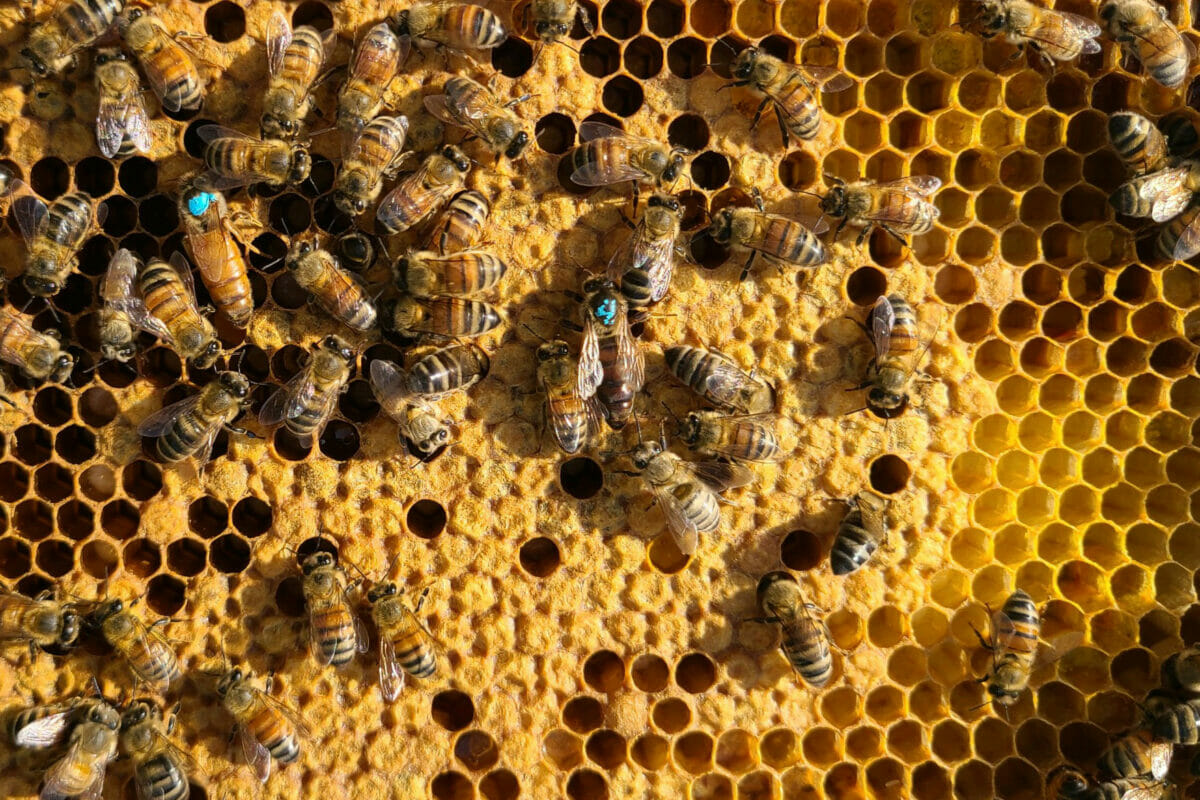
Virginia’s honeybees are dying.
Unfortunately, it’s not a unique problem; there’s hardly a region of the country that isn’t dealing with the mass death of vast numbers of honeybees or other pollinators. The Bee Informed Partnership estimates that U.S. beekeepers lost around 45.5 percent of their managed honey bee colonies between April 2020 and April 2021—the second-highest loss recorded by the organization.
But for Virginia’s state apiarist Keith Tignor, honeybees were Virginia’s “canary in the coal mine,” signaling a dramatic decimation of the various fauna that pollinate the state’s cultivated crops.
“Once we identified issues with the loss of the honeybees, particularly with hive management of honeybees but also with the feral or the wild honeybees, researchers and others began looking at other pollinator populations like our bumblebees, like our butterflies,” says Tignor.
Much is at stake to turn around the declining honeybee population numbers. Honeybees are essential pollinators for around a third of Virginia’s fruit and vegetable crops. Tignor warns that losing those bees could result in ecological side effects including increased produce prices at the market and a general need to shift dietary requirements to lean on crops that rely on wind pollination, like grains.
In an attempt to tackle the issue, Virginia has developed a noteworthy approach to handle the issue: a beehive distribution program that has garnered its share of advocates and critics alike. Any Virginian resident over the age of 18 can apply to be randomly selected to receive up to three free hives, with several sizes available to them from which to choose. Nonprofits, government agencies and businesses can’t apply, although the state allows individuals who later decide to form a bee-related business to keep the equipment.
“One of the things that we can do for the honeybees is…provide the equipment for people to establish beehives to at least sustain or possibly increase the population of honeybees that are out,” says Tignor.
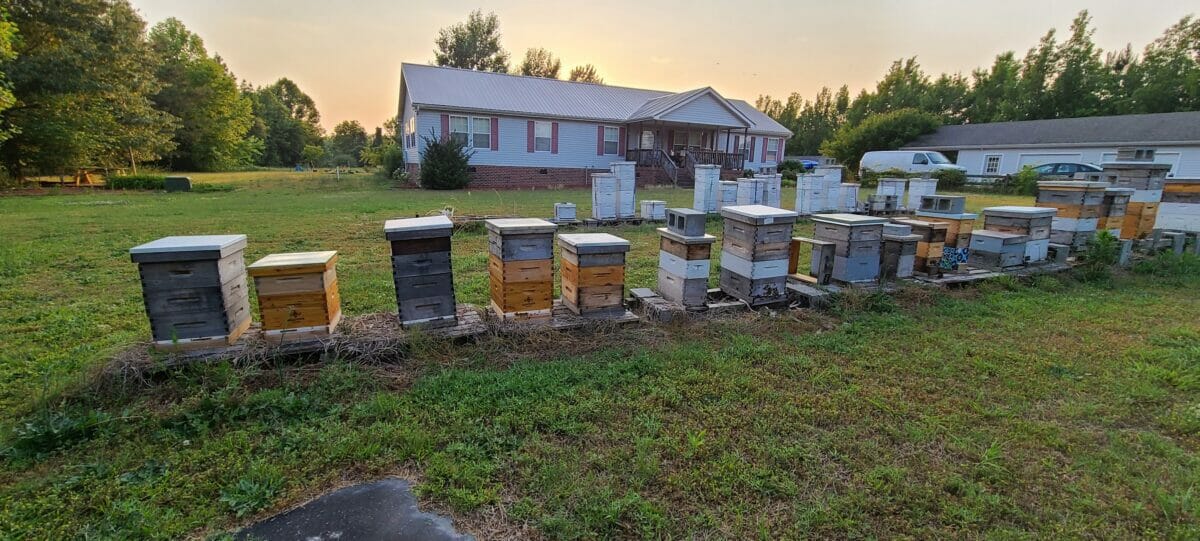
Photo courtesy of Kristine Smith.
Given that “honeybees are generous pollinators,” according to Tignor, the insects are expected to “increase habitat and forage for all of our other pollinators,” spurring an agricultural domino theory of sorts. And providing free beehives to Virginians just might tempt wannabe beekeepers to pitch in to help support a resurgent population.
Virginia’s beekeeping distribution program isn’t new. It originally started in 2013 as a grant program, reimbursing beekeepers for certain purchased equipment. In 2018, after numerous legislative and policy tweaks, it evolved into the equipment distribution lottery it is today.
Yet for such an intense and immersive activity, the program has no requirement for prior knowledge or experience with beekeeping to receive equipment. Some critics of the program take issue with that.
According to Tignor, roughly half of beehive applications in 2019 were from Virginians who didn’t list any current beekeeping experience. Fifty-two percent of applicants called themselves active beekeepers. Applicants with prior beekeeping experience noted owning an average of five hives.
The Virginia Department of Agriculture and Consumer Services (VDACS), which distributes the beehives, does provide recipients with a beekeeping manual that covers topics such as seasonal management and honey processing, a PDF that Tignor says is comprehensive but not in-depth, as well as a list of clubs and mentors offering classes.
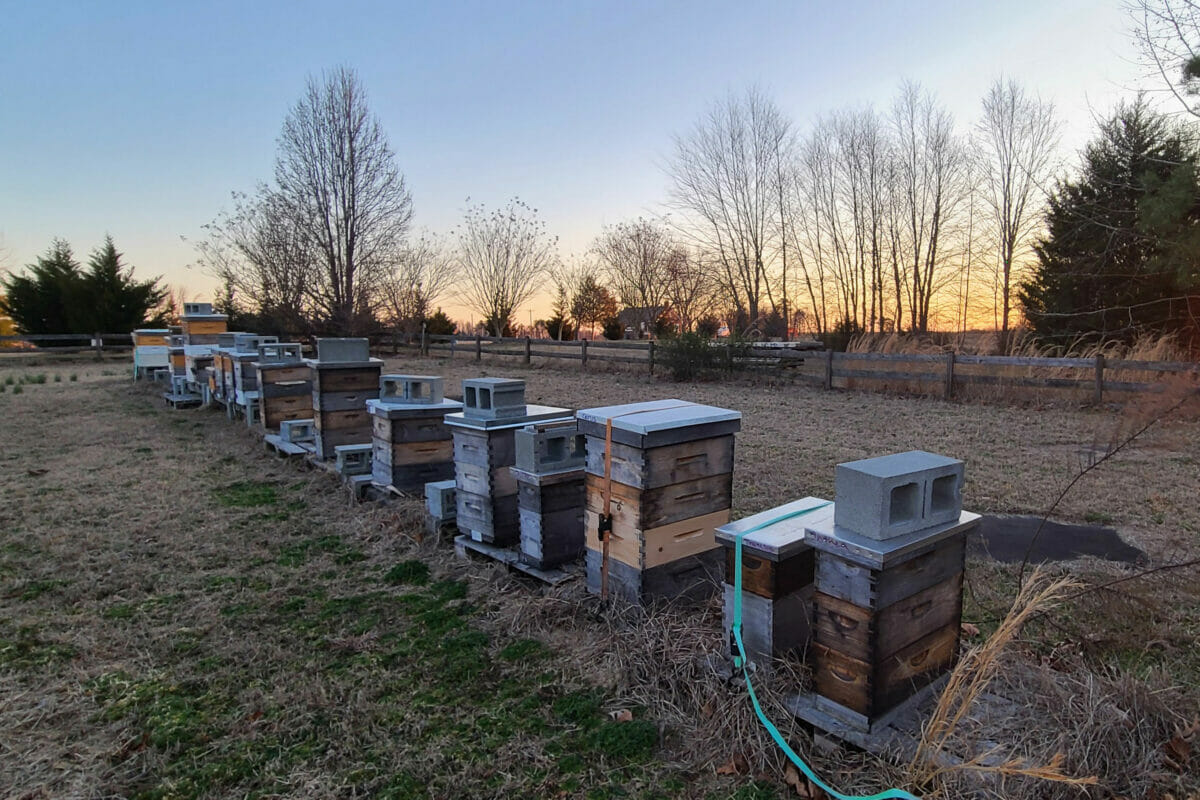
A row of beehives. Photo courtesy of Kristine Smith.
The state doesn’t test whether prospective bee equipment recipients have read the documents or retained the information, nor does the agency currently track whether recipients take a class or undergo any other education. However, a report prepared by VDACS in 2017 summarizing the impact of the first iteration of the program noted that just “two‐thirds of these individuals [who received grants for beehives] had received training in honey bee management prior to constructing their beehives either through a class or working with a mentor.”
The agency writes in a program guidance document that it reserves “the right to inquire into the legitimacy of any application, as well as the right to inspect any bee colony established in a beehive unit received as part of the program.” However, Tignor says there’s no hive inspection requirement per se, as inspections are typically conducted for someone selling bees or related products.
The agency also requires that “beehive units must be used to establish a new beehive with a viable colony of honey bees within one year of the date the items are received by an individual,” which Tignor says is more of a “visual verification” that there are bees flying around a constructed hive than an inspection of conditions inside the hive.
While the current program targets hobbyists, maintaining a hive of honeybees is more than just an amusing interest in which one can periodically indulge. The VDACS considered this, noting in the report that managing a beehive requires a high degree of physical labor—hive boxes filled with honey are not light—and knowledge of honeybee behavior. It goes on to cite the “closer monitoring” needed to mitigate the same honeybee pests and diseases that hasten the bees’ population declines. “The more information and training an individual receives in beekeeping, the greater the individual’s satisfaction and experience and the more likely this person will continue keeping bees,” the report continued.
How Do Virginian Beekeepers Feel About the Program?
Amateur beekeepers might not be aware of the major time investment required ahead of time, some Virginian beekeepers suggested. Nor might they have realistic expectations of the additional equipment needed.
Glenn Clayton, who runs Hungry Hill Farm in Shipman, Virginia, says that, in his experience, many new beekeepers are reluctant to pay for the electrical fencing needed in some parts of the state to ward off bears. Clayton can’t understand why the program doesn’t require any proof of education to get bee equipment.
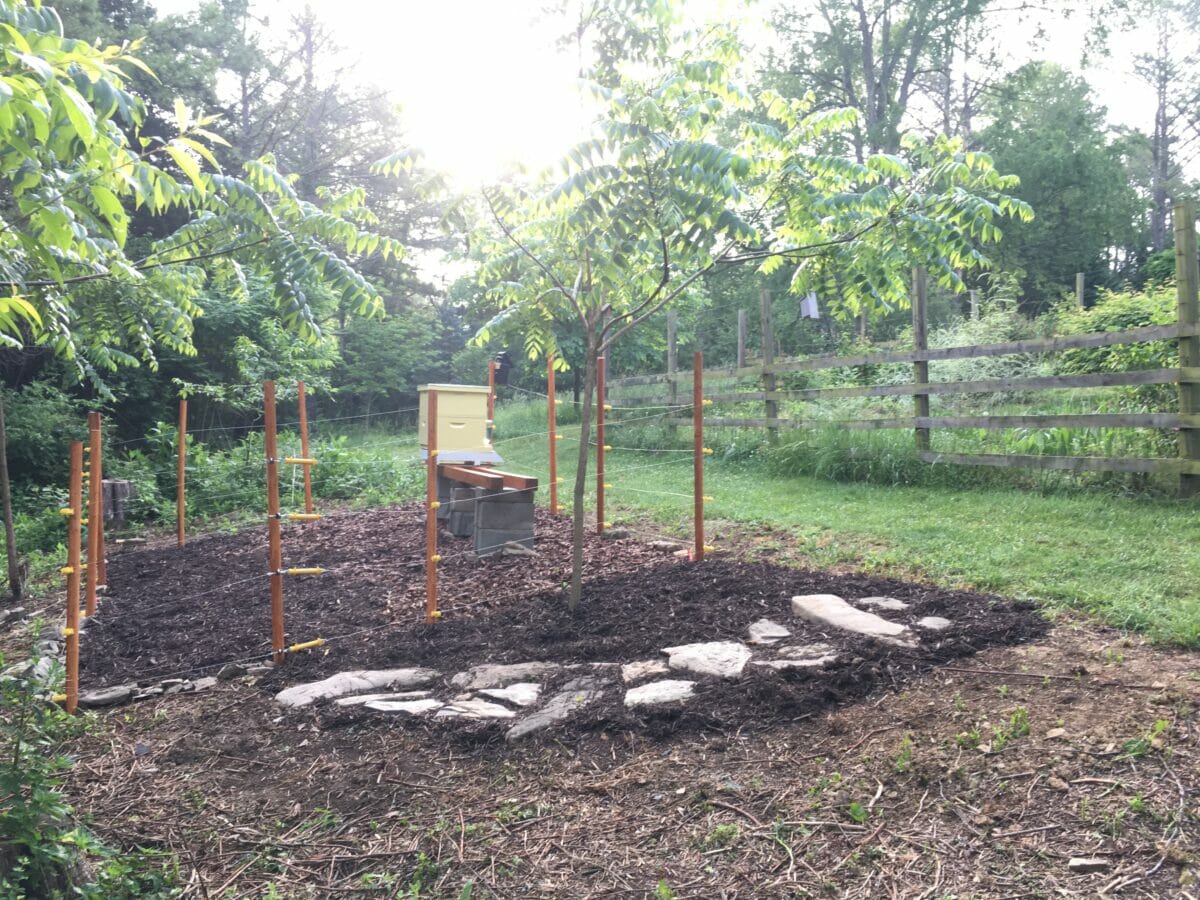
Electrical fencing around beehives helps ward off bears. Photo courtesy of Alissa Carter.
“I know several people that have gotten this [equipment] and they never took a course, they kept the bees one year—in fact some of them didn’t keep them one year—because they died off and they never did anything else with them again,” Clayton says. “If you’re going to get bees and let them die off, what’s that do [for the environment]?”
Beekeeper Stephen Rogers agrees. Because of his military experience, Rogers thinks the program is a good idea, but he says that “the road to hell is paved with them.” He wants the agency to do its “due diligence” and ensure the program’s benefits are maximized. “There needs to be accountability and there needs to be an assessment of the program,” says Rogers, who says that giving equipment to untrained beekeepers without following up to make sure the hives are doing well doesn’t feel like it passes that benchmark.
While some beekeepers agree there are reliable, truthful online resources for novices, several bemoaned relying on online videos and blogs to pick up tips.
Lynn Berry is one of those beekeepers. He never intended to take up the pastime, but seven seasons ago, his wife and mother-in-law decided the family should have bees. They also decided he would be the one to handle everything. After taking classes with the local beekeeping club group— the Moonshine Beekeepers Association of Rocky Mount, Virginia—he knew exactly what he needed to get started.
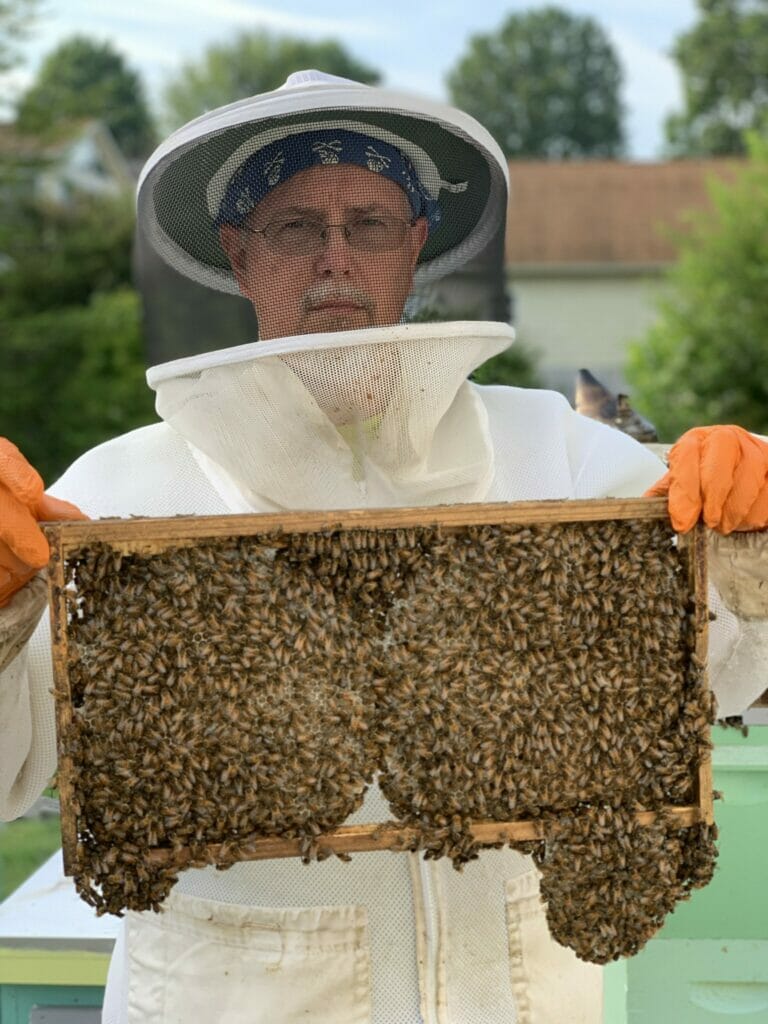
Lynn Berry holds up a frame of bees. Photo courtesy of Lynn Berry.
“Everybody should take a hands-on class,” says Berry. “On the Internet, there are some good resources, but nothing really beats hands-on instruction.”
Taking bad Internet advice killed Virginia beekeeper Anna Shimko’s bees. While she did attend a local class and has some family members with beekeeping experience, Shimko says that, as “an independent person,” she didn’t want to burden community members and pester people with a slew of queries.
So when Shimko read some tips on Facebook, she decided to try it. Soon after, she discovered all of her worker bees were dead. “The best way to learn beekeeping, in my opinion, is you absolutely take the class before you even have the bees,” Shimko says. “I need to feel, touch, smell. I need to be actively doing it to actually figure out how it works.”
Bringing New Beekeepers Into the Fold
For every beekeeper who casts doubt about distributing beekeeping equipment to untrained amateurs, another has no concern. Some even embrace the lack of an education requirement.
“The point of [the program] is to bring new beekeepers into the fold,” says Martha Kiene, president of the Virginia State Beekeepers Association, adding that she does encourage in-person learning.
But because new beekeepers might lack the funds or time to get educated in a hands-on way, she thinks it’s unfair for VDACS to impose such a restriction on applicants.
“You start putting this stuff on them and then it’s just unenforceable. And maybe you shouldn’t enforce it; maybe you just hope that the person will get some education, whether they’re self-taught, whether they have a mentor, whether their brother-in-law is going to help them with it, whether they go to the class…or the bee meetings,” says Kiene. “There’s a bunch of ways to become educated without taking an actual class.”
Annaliis Canty, a third-year Virginia beekeeper, says she hadn’t met any novices who weren’t interested in educating themselves properly or who were overconfident in their abilities. But she still wants the state to make sure future beekeepers have some idea of what they’re doing before getting started.
It has to be “something that demonstrates more than just ‘oh, yeah, I totally did that,’ and check the box,” says Canty. “Something a little more rigorous than that [in order] to say, ‘Yeah, I went through a class or I did some learning,’ and I’m not going to just let my bees fend for themselves.”
i spent lots time and work learning bee keeping, this year i applied didn’t get any. i am still going forward. tryed grafting queens, made more than i expected. i had 2 hives now have 12 strong hives without government help. giving someone bees with no experience over someone took time to learn probably not going help much. lot to keeping bees. i’m still learning.i am growing
Not a horrible idea, but probably not the most efficient way to promote beekeeping.
Believe businesses and non-profits should also be allowed to get the bees. They’d likely have more people available to do the work involved. Also, very much agree all should be trained. Otherwise, it’s a waste of money, equipment, and bees.
I wonder if any follow-up surveys were taken after a year to determine if people did get any type of education and if their bees were thriving, struggling or dead.
I also wonder if any guidelines or criteria were given to determine eligibility of keepers based on geographical/environmental location (will bees have all their needs met – food, water, etc) and proximity to a mentor/bee club.
I have been raising bees for about 3 years on my farm on the western slopes of the Blue Ridge. I noticed the bee population waning each year and decided something had to be done. I started with packaged Saskatraz bees (Sassy) for their cold hardiness and temperment. They were initially bred in Canada. I started with a top bar hive and I am self taught. They multiplied so quickly that 1st season, I had to split them into another hive. Great honey output. This year I split them again into a langstroth hive. They are housed in a shed… Read more »
I just wonder how many beekeepers were born knowing what to do, seems to me that these people are more worried about their profits than saving the bees?
Hot take: honeybees are not ecologically important to north America. They’re not native to North America! Honeybees are livestock, brought here and bred here for agricultural and commercial purposes. And for agricultural and commercial purposes, absolutely it’s important that there are enough bees to pollinate crops and produce honey for market. But for environmental purposes: honeybees are invasive insects that consume resources that native bees rely on. There are literally thousands of species of native bees in North America, and many of them are not doing well either. The presence of honeybees only makes it harder for them. If you… Read more »
What are the identified and unidentified causes of this on-going die off?
How are they being ameliorated by this effort? Does this approach improve
the array of elements and conditions degrading this population pollinators?
What could go wrong?
What are the unintended consequences?
Without answers, isn’t this just a project full of hopium?
I wish SC had a program like what VA started. I have a neighbor with about 12 hives. He really enjoys it. Being a diabetic, I would give 99% of the honey away, but the experience would be great so as to help others with their hives. I now try to help the native polinators like Mason Bees thrive. It’s fun and rewarding.
SOUNDS GOOD TO ME. YOU SHOULD BE ABLE TO PICK UP A FEW BEE KEEPERS THIS WAY. IT THE GUY OR CLUB PAYING/RAISING THE BEES DOESNT MIND WHY SHOULD ANYONE ELSE